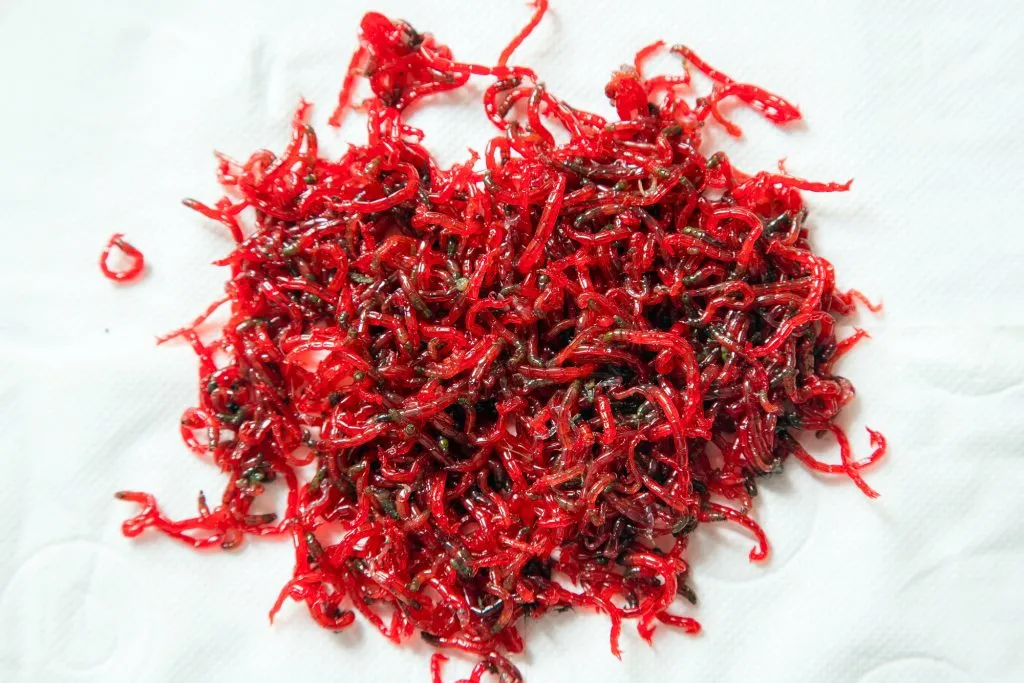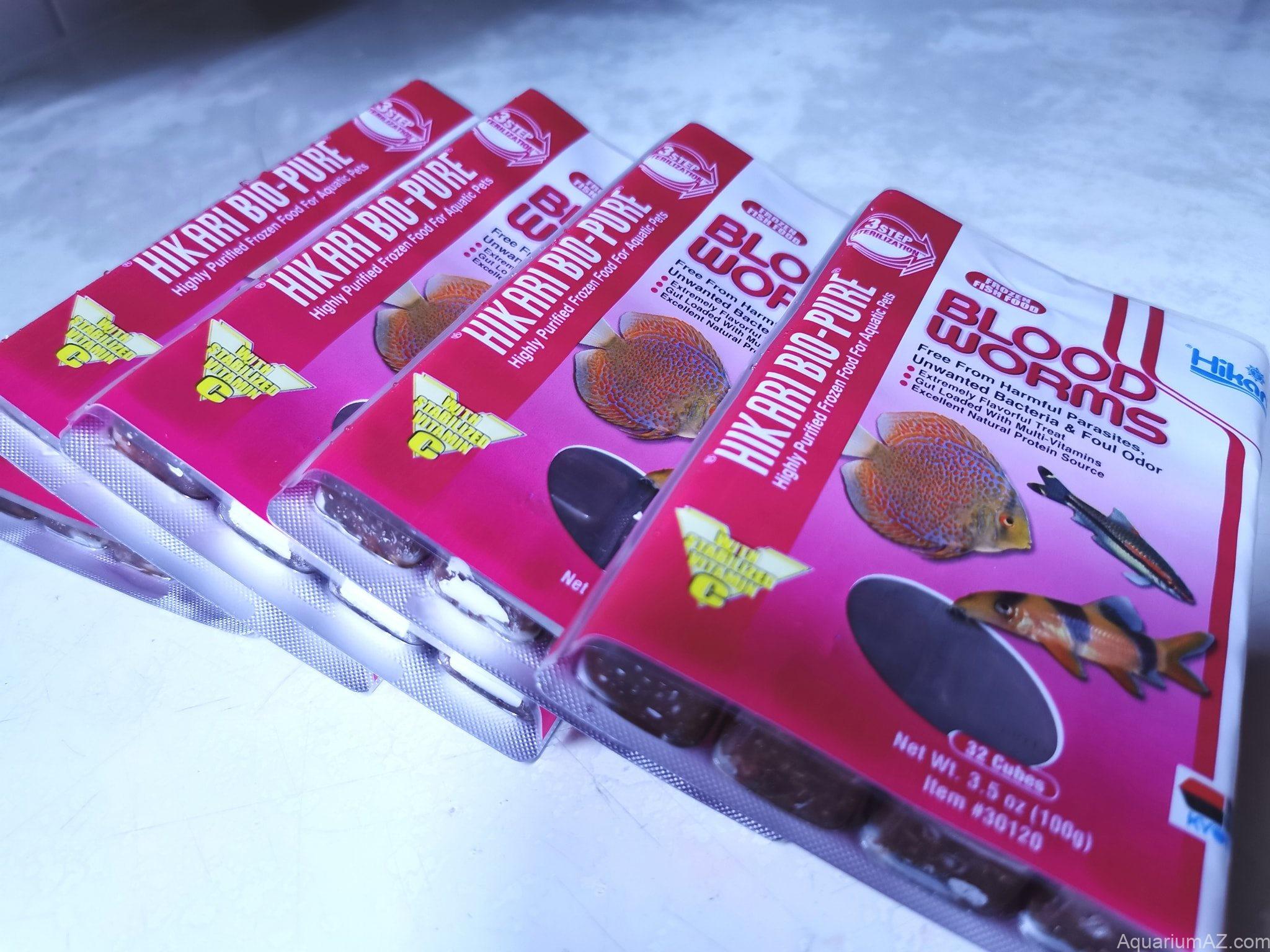The Nutritional Benefits of Blood Worms for Your Aquarium Fish
If you’re an aquarium hobbyist, you’ve likely heard of bloodworms. But do you know where they come from and if they are beneficial to your fish? In this article, we’ll explore the different types of bloodworms and their purpose.
What Are Blood Worms?
Bloodworms can refer to different species, which can be confusing for newcomers. In the aquarium hobby, bloodworms are the larvae of small flies called midges. These larvae are less than half an inch long and are red because of the hemoglobin in their bodies, which helps them breathe in low-oxygen environments.

What are the typical freshwater environments where bloodworms can be found?
Bloodworms can be found in freshwater environments such as ponds, rivers, lakes, and even wet soil. They can also be raised on bloodworm farms and purchased from fish-keeping and pet stores in frozen or freeze-dried packs.

For what purpose are bloodworms commonly utilized?
Bloodworms are commonly used as a supplementary diet for freshwater fish, but there is conflicting information about their benefits. This article will provide you with the basic facts so you can make an informed decision about feeding bloodworms to your fish.
Benefits
Bloodworms are a great food source for carnivorous and omnivorous fish. They are excellent for conditioning fish and can really bring out their colors. Bloodworms provide a natural, unprocessed food source, just like what your fish eat out in the wild, and fish just love hunting live bloodworms in their tank!
Nutritional Infor
Bloodworms are a highly nutritious food source for fish and contain a range of essential nutrients. They are a good source of protein, which is essential for building and repairing tissue in fish. Bloodworms also contain a range of vitamins and minerals, including vitamin A, vitamin D, vitamin E, vitamin B12, calcium, and iron.

Pros:
- Convenience: Dried or frozen blood worms are very convenient to use, as they can be easily stored in the freezer and thawed out when needed. This makes them a great choice for busy fishkeepers.
- Long shelf life: Dried or frozen blood worms have a long shelf life, which means you can buy them in bulk and use them as needed.
- Nutritious: Blood worms are a good source of protein and other nutrients that are important for the health of your fish. They can help support growth, immune function, and overall health.
- Variety: Adding dried or frozen blood worms to your fish’s diet can provide some variety and prevent them from getting bored with their food.
Cons:
- Limited nutrition: While blood worms are nutritious, they should not be the only food in your fish’s diet. They lack essential nutrients like fiber and vitamins that are found in other types of fish food.
- Cost: Dried or frozen blood worms can be more expensive than other types of fish food, especially if you buy them in small quantities.
- Messy: Blood worms can be messy and leave a lot of debris in the water. This can make it difficult to maintain a clean and healthy aquarium environment.
- Risk of disease: Using dried or frozen blood worms can increase the risk of disease transmission if they are not properly handled and stored. It is important to follow proper food handling procedures to minimize this risk.
Overall, dried or frozen blood worms can be a nutritious and convenient addition to your fish’s diet. However, they should be used in moderation and should not be the sole source of nutrition. It is important to weigh the pros and cons before deciding to use them as fish food.
Here are some common types of fish that enjoy eating dried or frozen bloodworms:
- Betta fish
- Discus fish
- Guppies
- Tetras
- Angelfish
- Dwarf cichlids
- Killifish
- Rainbowfish
- Rasboras
- Siamese fighting fish (also known as betta fish)
Common FAQs
Goldfish can live for several years with proper care, with some varieties living up to 10-15 years or more.
Goldfish prefer cooler water temperatures ranging from 65-75°F (18-24°C), so it’s essential to avoid overheating the aquarium.
Goldfish are social creatures and can benefit from companionship, but it’s essential to choose tank mates that are compatible with their size and temperament.
Goldfish should be fed a balanced diet of high-quality pellets or flakes once or twice a day, avoiding overfeeding to prevent health issues.
While goldfish can survive in a bowl temporarily, they require a larger tank with proper filtration and maintenance to thrive long-term.
Like any type of food, overfeeding blood worms can lead to health problems for your fish. Additionally, some fish may become too dependent on blood worms and may be reluctant to eat other types of food. It’s important to offer a varied diet to promote overall health and nutrition for your fish.
Dried/frozen blood worms are usually just as nutritious as live blood worms. However, it’s important to store them properly and use them before their expiration date to ensure maximum nutritional value.
Blood worms are suitable for most freshwater and saltwater fish, but it’s important to check the dietary requirements of your specific fish species. Some fish may have different nutritional needs and preferences.
Blood worms should be fed in moderation, usually as a supplement to a well-balanced diet. Depending on the size and species of your fish, feeding once or twice a week is often sufficient.
You can thaw the blood worms by placing them in a small container of water for a few minutes before feeding. Some fish may prefer to eat them directly from the water without thawing.
Sign up for our Newsletter ! Fish, Coral, Plant, Gear and More!
Become Part of Fish Keeper Community
